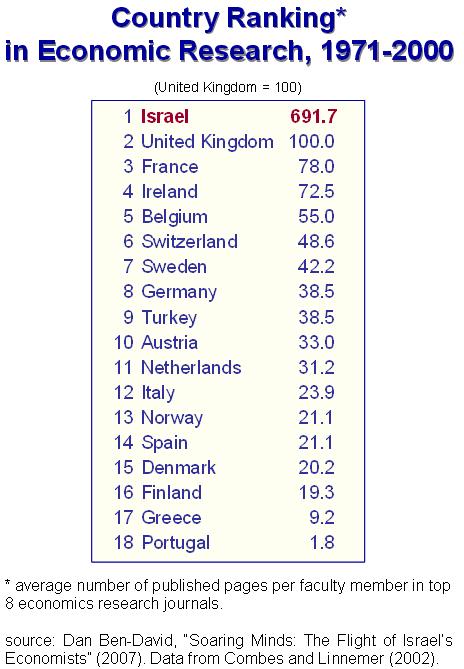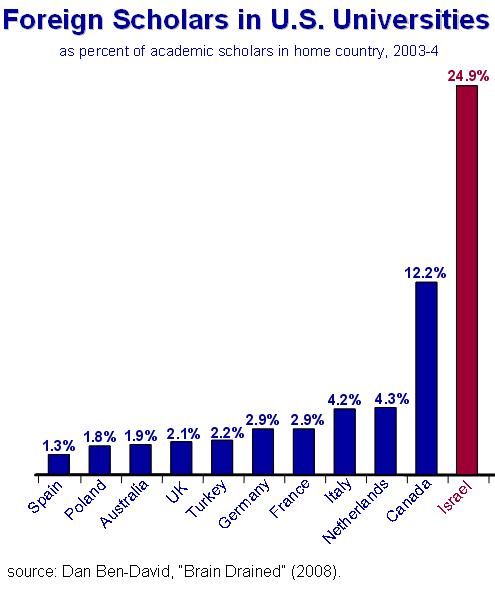|
PDF file
published as two separate articles
in Haaretz’s 60th Independence Day edition on Israel’s successes and failures, May 7, 2008.
Israel’s Academia – The Bright and Dark Sides
by Dan Ben-David First
Article The
Bright Side of Israel’s Academia The story of higher education in
Israel is a story about one of the jewels in the crown of the Zionist movement. Annual Israeli incomes averaged just $6,000
during the 1950s and $10,000 during the 1960s (according to GDP per capita in 2005
prices) – about half of American incomes at the time and roughly a fifth and a
third, respectively, of Israel’s current living standards. Despite its meager resources and the
relentless attacks on its physical existence, the Israel’s combination of
vision, determination and tremendous sacrifices provided the country with seven
state-of-the-art research universities within two and a half decades of its
birth. How good did these institutions become? In the field of economics, for example, European
countries were ranked according to the average number of published pages per
faculty member in the top eight economics research journals over a span of
three decades, from 1971 through 2000. In
the accompanying table, England – with its London School of Economics, Oxford
and Cambridge Universities – serves as the base country. Below it are Sweden, the country that bestows
Nobel Prizes, with just half the number of published pages as the English, the
Netherlands, with less than a third, Italy, with less than a quarter, and Finland
– with a primary and secondary school system that is the envy of the western
world – with a research yield that is less than a fifth of the English. In first place, above the English, were
Israel’s economists. For three decades, which
began just over two decades after the country’s birth, Israeli economists
published not 10% more and not 20% more, but seven times the English research
output in the top academic journals. In general, when moving from one field
to another over the past decade, from chemistry and physics through economics
and computer science, there are two, three and sometimes up to five Israeli
universities consistently ranked among the top 150 in the world in each of the
fields (on the basis of citations in scientific journals). The country’s academic excellence is evident
not only in the recent Nobel Prizes that its scholars received, but also in the
exceptional number of Israelis that have been invited to study and to teach on
a permanent basis at leading universities around the world. First-class research universities have
an important role to play in every country.
This is particularly true when the economy in question has a labor force
no larger than a single western metropolitan area – and is situated on a
sandbar in the middle of a very turbulent ocean. This perspective makes it possible to
understand the magnitude of the miracle that occurred here. Israel’s universities nourished the
environment that enabled the invention and development of unique products and
processes that allowed us to survive – and even prosper in some fields – in the
merciless competition of the global economy, and enabled Israel to break
through the frontiers of human knowledge time and again to continuously upgrade
and fortify the defensive shield that assures our existence against all threats
and against all odds. Second
Article The
Dark Side of Israel’s Academia First-class universities are first and
foremost the professional homes of leading researchers and scientists, individuals
who bring honor – not to mention scientific, economic and cultural value added
– also to institutions that are not Israeli.
Therefore, what can one expect when high personal caliber is merged with
a domestic managerial setting devoid of the tools necessary for dealing with
foreign talent-poaching of Israelis? The actual picture is grimmer still
since not only are foreigners hunting for young Israeli talent, but we are also
giving that talent the boot with our own feet.
As indicated in the diagram, we have reached a situation in which the
number of Israeli scholars in the U.S. represents one-fourth (!!) of the entire
senior faculty remaining in Israeli’s universities and colleges. It is no coincidence that the share of senior
Israeli faculty in the States is six times the share of academic emigrants from
the leading European country. It is also
no coincidence that the share of Israeli scholars holding full-time positions
in the top 40 American departments in fields like chemistry, physics, philosophy,
economics and computer science is unparalleled. Academic salaries in Israel have
consistently declined in relation with academic salaries abroad and in relation
with salaries in relevant private sectors within Israel. Therefore, why should it be surprising that a
large number of our most gifted individuals are looking for the door – or are
choosing not to even enter academic life altogether? As if salary gaps were not enough, we are
also witnessing increasing gaps in the funding of basic research between Israel
and other countries – which in turn not only harms domestic research but also
impairs the possibilities for personal promotions in the future. Another domestic boot in the pants
comes from a steady decline of roughly 50%
in the per capita number of positions in research universities. An entire generation was abandoned on the
outside, even those wishing to return despite the large gaps in salaries and
research funds. External micromanagement
that is blind to long-run considerations has imposed destructive constraints on
the universities that are reflected in (among other things) non-provision of
regular full-time positions for new graduates, forcing them to work as external
teachers with disgraceful wages, scandalous social benefits and non-existent
research conditions – which then guarantee that these individuals will be
pushed farther and farther behind the research frontier, and their academic
fate will be sealed. Israeli universities – which enabled
the country to reap the benefits of the high tech revolution when it erupted, and
made it possible for us to maintain an existential qualitative advantage in the
realms of industry and defense – are products of the investments made by our
founding fathers’ generation. But the
much wealthier subsequent generation diametrically changed Israel’s national
priorities and reallocated its resources, transplanting the national
perspective with sectoral and personal ones, replacing strategic planning with
blind faith, swapping common sense with obsolete ideologies – and supplanting
the great hopes that our generation was raised on with the black hole that we
may bequeath to our children’s generation, if we don’t get our act together in
time. comments
to:
danib@post.tau.ac.il
|

